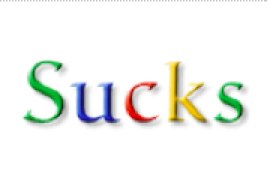 A decade ago I tried Google for the first time. Like everyone said, it was magic – the result I wanted was right there at the top. For someone who’d been using AltaVista for years before that it was a very pleasant experience. Anyone who was on the Internet before Google came along knows exactly what I’m talking about. Google just felt right. It got the job done.
A decade ago I tried Google for the first time. Like everyone said, it was magic – the result I wanted was right there at the top. For someone who’d been using AltaVista for years before that it was a very pleasant experience. Anyone who was on the Internet before Google came along knows exactly what I’m talking about. Google just felt right. It got the job done.
It’s been a creeping feeling, growing over the years, but it sort of feels like pre-Google again. Search is a really bad overall experience. Travel searches, for example, are a joke, and startups like Gogobot are popping up to try to fix that. When I’m trying to figure out the best hotel for me when I travel I bail on Google entirely and head to Tripadvisor (shudder), and Gogobot.
Same for gadget product reviews. GDGT, Amazon and occasionally Consumer Reports seem to have the best collections of data, so I just go there directly and bypass Google. In fact, I use Google mostly for navigation, not discovery these days. Meaning I know the document I’m trying to find and figure out the best search query to locate it. But pure discovery? It’s a shit show of layer upon layer of SEO madness vying for my click.
Is there actual evidence of Google failing at search? Probably somewhere, but certainly not in the search share numbers. They maintain a healthy, almost monopolistic, lead in search despite huge efforts by Microsoft to compete. But then again, AltaVista had huge search share too, right before they suddenly didn’t any more.
And while I watch search startups like Blekko make serious attempts to fix search by thinking about the problem a little differently, it’s just too early to know if they’ll succeed.
So what is the evidence that search still sucks? Well, you know it’s true, just like me. And the fact that the mighty Google is suddenly taking every opportunity to toot their own search horn shows they know it, too. They tore into Microsoft for stealing data with just a little too much vehemence. In the end it felt like less of a gotcha moment, and more like entrapment.
And then today, with this JC Penney nonsense. For months the company gamed Google to get the top result in dozens of lucrative product searches. Google recently discovered it and shut it down. And then, as best I can tell, fed the story to the NY TImes as a sort of victory lap.
I say it should be an embarrassing moment for Google, not one to celebrate. In fact I did say it, here. Google’s Matt Cutts responded by lightly trashing Bing: “@arrington the newer/most recent spate of links happened in the last 3-4 months; not over a year. JCP still ranking on [dresses] on eg Bing.”
Which is fine. It’s always fun to slap Bing around a little, I guess.
Vanessa Fox, who used to fight spam at Google, weighed in as well, saying “@arrington – spam fighting will always be an ongoing battle at Google. Have to balance being aggressive in algorithms w/ collateral damage.” Earlier today she also reported on the JC Penney story.
When companies start to flail they nearly always do a couple of things. First, they trash the competitors. Then they talk about how hard the problem is and that the solution is a long term one.
Altavista did a lot of that in the late nineties. Right before a competitor came in and fixed the AltaVista problem permanently.
Yes, search is very hard. But Silicon Valley is really good at doing hard things. The real problem right now is that there’s a perception that Google is untouchable in search. When a venture capitalist sees a pitch from a new search startup all they can think about is the Cuil debacle. And since venture capitalists are just about the most risk averse people in Silicon Valley, the funds just don’t flow.
But all the evidence suggests otherwise. Demand Media is worth $1.6 billion, and their entire business is based on pushing cheap, useless content into Google to get a few stray links. If Google was good at search, Demand Media wouldn’t exist. And Bing wouldn’t be making solid gains in search market share. And JC Penney wouldn’t be able to massively game search results for a few months, during the holiday season, without getting caught until months later.
We need to see a real competitor emerge in search. If only because it will make Google up its game, and make all of us a lot happier.
